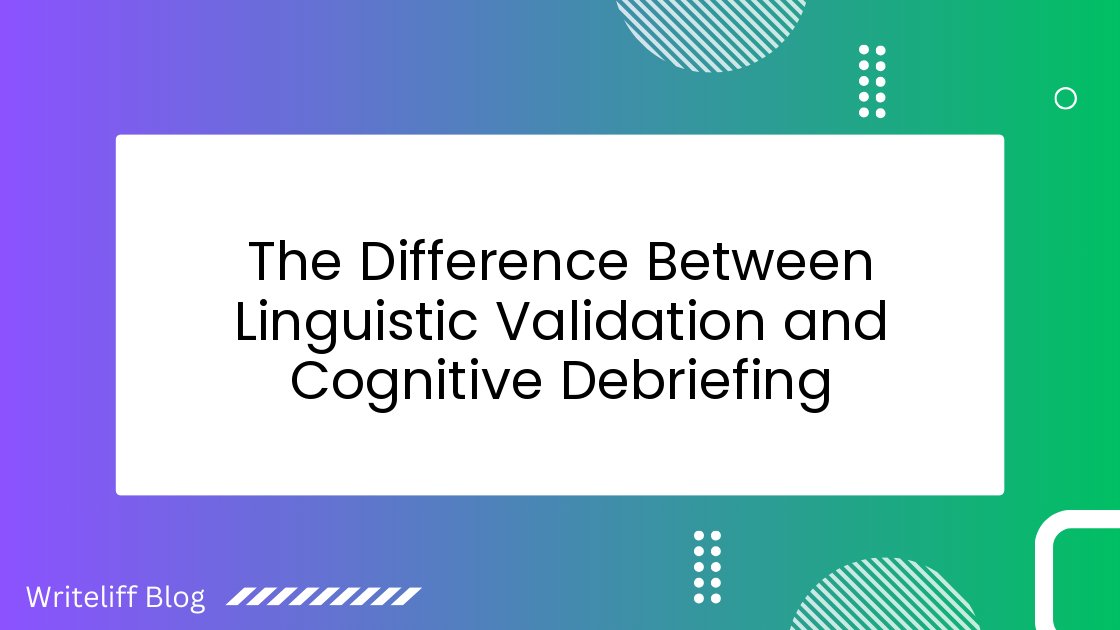The Difference Between Linguistic Validation and Cognitive Debriefing

When working with a professional translation service, it’s essential to understand the various processes involved in ensuring the quality and accuracy of your translated content. Two critical methods used in the translation industry are linguistic validation and cognitive debriefing. While both aim to improve the quality of translations, they serve different purposes and involve distinct processes. In this blog post, we’ll explore the differences between linguistic validation and cognitive debriefing, helping you make informed decisions when selecting a translation service for your needs.
What is Linguistic Validation?
Linguistic validation is a process that focuses on ensuring the accuracy, cultural appropriateness, and readability of translated content. It involves a thorough review of the translated material by native speakers who are experts in the subject matter. The main goals of linguistic validation include:
- Conceptual equivalence: Ensuring that the translated content conveys the same meaning as the original text.
- Cultural adaptation: Adapting the content to suit the cultural context of the target audience, including idiomatic expressions, humor, and references to local customs.
- Readability: Ensuring that the translated content is easy to read and understand for the target audience.
What is Cognitive Debriefing?
Cognitive debriefing is a process that focuses on evaluating the comprehension and interpretation of translated content by the target audience. It involves testing the translated material with a small group of representative users to gather feedback on their understanding of the content. The main goals of cognitive debriefing include:
- Comprehension: Assessing whether the target audience can understand the translated content as intended.
- Interpretation: Evaluating whether the target audience interprets the content in the same way as the original audience.
- Usability: Identifying any issues that may affect the usability of the translated content for the target audience.
Key Differences Between Linguistic Validation and Cognitive Debriefing
While both linguistic validation and cognitive debriefing aim to improve the quality of translations, they differ in several key aspects:
Focus
Linguistic validation focuses on the accuracy, cultural appropriateness, and readability of the translated content, while cognitive debriefing focuses on the comprehension, interpretation, and usability of the content by the target audience.
Process
Linguistic validation involves a thorough review of the translated content by native speakers who are experts in the subject matter. In contrast, cognitive debriefing involves testing the translated material with a small group of representative users to gather feedback on their understanding of the content.
Outcome
The outcome of linguistic validation is a translation that is accurate, culturally appropriate, and easy to read for the target audience. The outcome of cognitive debriefing is a translation that is well-understood, correctly interpreted, and usable by the target audience.
Choosing the Right Professional Translation Service
When selecting a professional translation service, it’s essential to consider the specific needs of your project and the level of quality assurance required. Some factors to consider include:
- Industry expertise: Look for a translation service with experience in your industry, as they will be better equipped to handle the nuances and terminology specific to your field.
- Quality assurance processes: Ensure that the translation service offers both linguistic validation and cognitive debriefing as part of their quality assurance process, as this will help guarantee the accuracy, cultural appropriateness, and usability of your translated content.
- Native speakers: Work with a translation service that employs native speakers for both linguistic validation and cognitive debriefing, as they will have a better understanding of the cultural context and language nuances of the target audience.
Conclusion
Understanding the differences between linguistic validation and cognitive debriefing is crucial when selecting a professional translation service for your needs. By choosing a service that offers both processes as part of their quality assurance, you can ensure that your translated content is accurate, culturally appropriate, and well-understood by your target audience, ultimately leading to better engagement and success in your global expansion efforts.